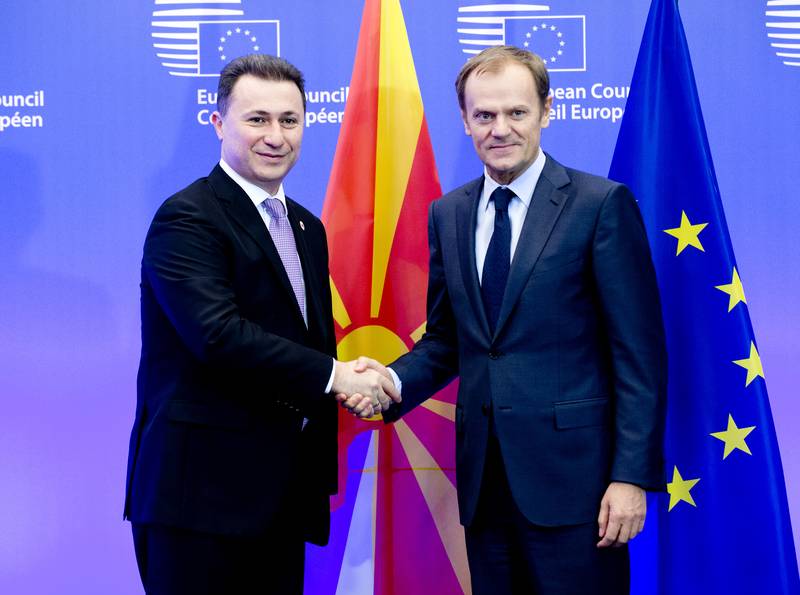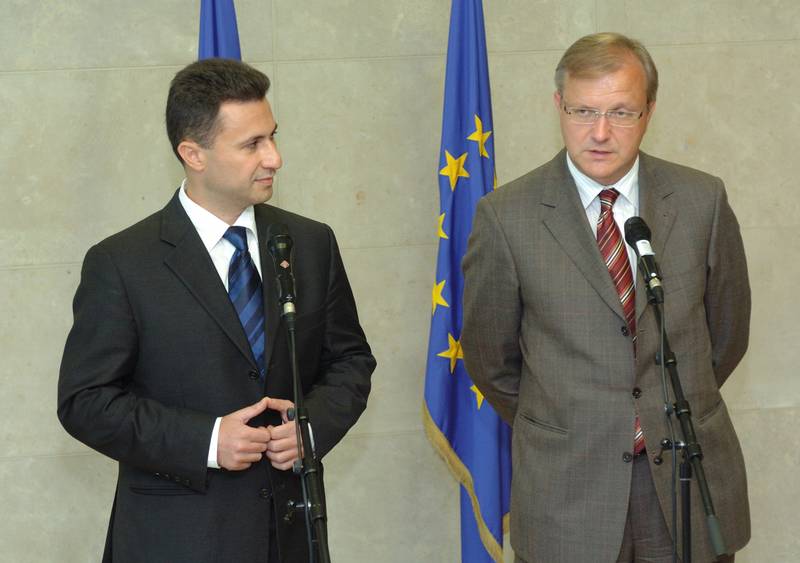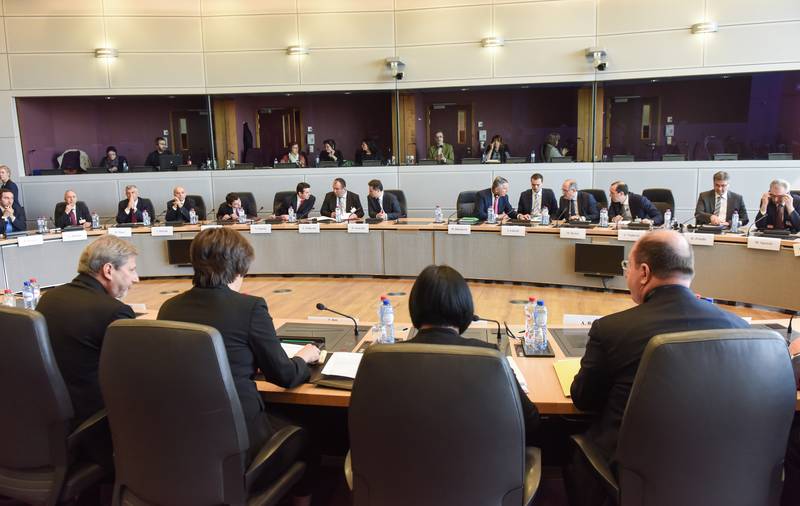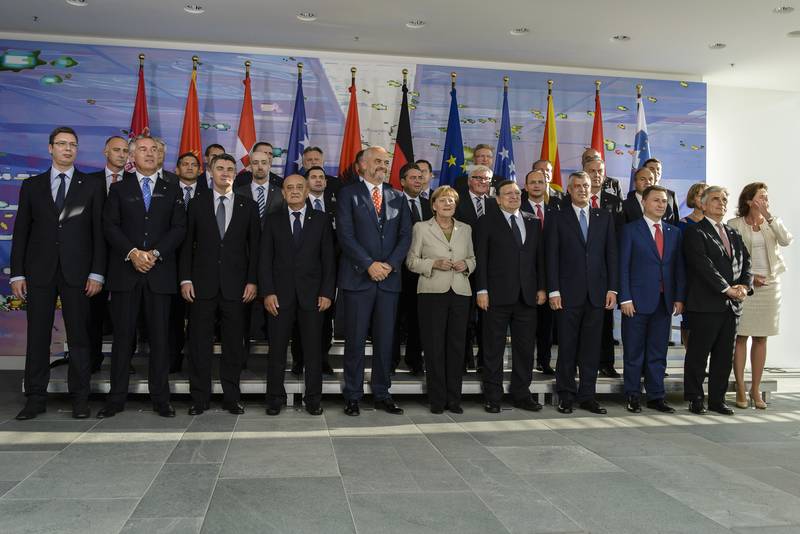Enlargement Policy Has Failed in Macedonia
Adelina Marini, May 15, 2015
 The developments in Macedonia are a natural consequence of the complete failure of the EU enlargement policy in the former Yugoslav republic. Because of the Greek veto, the EU has practically lost its only leverage for exerting influence over the reforms process in the country, namely the carrot. At the moment, the EU can only brandish the stick in the form of reports, statements, declarations, resolutions, but it cannot offer anything that Macedonia might want. The case of the country shows that the EU has either not learned the most important lesson from enlargement or, for political reasons, has ignored it. And that lesson is that if you want a reform you need to show what comes next - beginning of negotiations, opening of a new chapter, increasing the pre-accession funds or something else. This is absolutely imperative in the countries where democracy is still an alien body.
The developments in Macedonia are a natural consequence of the complete failure of the EU enlargement policy in the former Yugoslav republic. Because of the Greek veto, the EU has practically lost its only leverage for exerting influence over the reforms process in the country, namely the carrot. At the moment, the EU can only brandish the stick in the form of reports, statements, declarations, resolutions, but it cannot offer anything that Macedonia might want. The case of the country shows that the EU has either not learned the most important lesson from enlargement or, for political reasons, has ignored it. And that lesson is that if you want a reform you need to show what comes next - beginning of negotiations, opening of a new chapter, increasing the pre-accession funds or something else. This is absolutely imperative in the countries where democracy is still an alien body.
In the case of Macedonia, for 10 years nothing was coming next apart from another "you deal with Greece first and then come again". There was not even a promise by the EU to try and convince Greece to be more active and quicker. This is a devastating inadvertence on behalf of the EU with severe consequences.
Macedonia could have already been a member of the EU had it not been for Greece's blockade. In the past few years there have been timid remarks that it is not right a single country (out of 28) to block a significant foreign policy priority. This was heard several times during the hearings of candidates for members of the new Commission. Nothing of this in practise. This year is the 10th anniversary since the EU put a candidate-status tag on Macedonia. Since then, however, instead the country to be progressing on the path of European integration and to transform under the experienced oversight of the Commission and the Council (in the past 10 years the EU has accumulated huge experience with its biggest enlargement in history toward various countries in terms of structure, history and mentality). But instead, the EU has left the country to implode slowly but certainly.
What is happening in Macedonia?
According to our colleague from the Balkan Investigative Reporting Network (BIRN) Mary Jordanovska, there is a huge conflict going on in Macedonia - verbal, ethnic and political. The situation, she explains in a chat with euinside on Facebook, has deteriorated significantly with the publication of the so called "political bombs" - the wire-tapping records the opposition party SDSM has been releasing - which contain wire-tapping of conversations of ruling politicians and which reveal large-scale corruption, election fraud, abuse of power. This unleashed massive protests against government reforms, starting with the student movement, then part time workers, high school students and the latest are those who protested against police brutality. Mary Jordanovska believes that the wire-tapping scandal has increased the anger of the Macedonian citizens against the government. "That’s why the motives and the timing of the so-called terrorist attack in Kumanovo is brought to question – there are many unresolved issues about why this incident happened now and whether it did not happen to reduce the influence of the political bombs of SDSM", the journalist says.
On the day she wrote her answers in the regional press appeared information that the resignations of Interior Minister Gordana Jankulovska and intelligence chief Saso Mijalkov came as a result of a meeting of Prime Minister Nikola Gruevski in the US embassy where he listened to wiretaps revealing political contacts with the leaders of the terrorist group that organised the attacks in Kumanovo.
Where were you when ...?
In Croatia there is a highly sensitive question which is asked usually with a reproach: "Where were you in 1991", alluding to participation in the independence war of Croatia. I remembered this question after I reviewed the reactions of the international community and especially the EU, which is sitting and observing, practically with indifference, the implosion of Macedonia. After the attacks in Kumanovo, when eight policemen died and tens other were wounded, the ambassadors of USA, Britain, France, Italy, Germany and the EU made a joint statement in which they condemn the developments in Kumanovo but in the same time express concern that Nikola Gruevski's government has not achieved any progress in terms of accountability for many of the allegations of government wrongdoing revealed by the opposition wiretaps. "This continued inaction casts serious doubt on the Government of Macedonia’s commitment to the democratic principles and values of the Euro-Atlantic community".
The reaction of EU Enlargement Negotiations Commissioner Johannes Hahn (Austria, EPP) was also a sharp one. He expressed deep concern with the situation in Kumanovo and appealed on the authorities and all political and community leaders to cooperate for restoring the calm. Mr Hahn also called for the full investigation of the events "in an objective and transparent manner within the Law". There were reactions also from the neighbouring countries which, however, were a complete opposition to the declarations coming from the EU and the international community. The statements from Bulgaria and Serbia varied from panic and fear to modesty and reason which reveals the regional scale of the problem. All this quite legitimately raises the question "And where were you when Macedonia started to implode?".
Timeline of the implosion
 EU gave Macedonia a candidate status in 2005 together with Turkey and Croatia. The latter is now a member of the Union (since 1 July 2013) and Turkey is negotiating with very slow pace as some of the most important negotiating chapters are blocked by individual member states. Negotiations with Macedonia cannot begin because Greece vetoed the very opening of the negotiations. In the spring of 2012, 7 years later, the then Enlargement Commissioner Stefan Fule (the Czech Republic, S&D) launched a high level accession dialogue with Macedonia, which is practically aimed to replace the negotiations until the Greek veto is abolished. Alas, despite Mr Fule's efforts, that dialogue has not delivered and has gradually lost importance. Fule's idea was to keep Macedonia in the European orbit as the opinion polls had already suggested a loss of support for membership and the political class was already demonstrating a clear affinity for soft authoritarianism which is becoming now typical for the countries that are lagging behind with their European integration, like Serbia for instance.
EU gave Macedonia a candidate status in 2005 together with Turkey and Croatia. The latter is now a member of the Union (since 1 July 2013) and Turkey is negotiating with very slow pace as some of the most important negotiating chapters are blocked by individual member states. Negotiations with Macedonia cannot begin because Greece vetoed the very opening of the negotiations. In the spring of 2012, 7 years later, the then Enlargement Commissioner Stefan Fule (the Czech Republic, S&D) launched a high level accession dialogue with Macedonia, which is practically aimed to replace the negotiations until the Greek veto is abolished. Alas, despite Mr Fule's efforts, that dialogue has not delivered and has gradually lost importance. Fule's idea was to keep Macedonia in the European orbit as the opinion polls had already suggested a loss of support for membership and the political class was already demonstrating a clear affinity for soft authoritarianism which is becoming now typical for the countries that are lagging behind with their European integration, like Serbia for instance.
In the beginning of October last year, the Commission recommended for a sixth time in a row negotiations to begin but the Council answered in December in this way: "The Council broadly shares the Commission's assessment that the political criteria continue to be sufficiently met on the basis of cumulative progress achieved and takes note of the Commission’s recommendation that accession negotiations be opened with the former Yugoslav Republic of Macedonia. With a view to a possible decision of the European Council to open accession negotiations with the former Yugoslav Republic of Macedonia, the Council will revert to the issue anytime in 2015, on the basis of an update by the Commission on implementation of reforms, including in the context of the High Level Accession Dialogue, and on tangible steps taken to promote good neighbourly relations and to reach a negotiated and mutually accepted solution to the name issue".
And although it never said it directly, the European Commission has been warning for years that Macedonia is turning into a black hole in the Balkans because of its complete isolation in the region and in EU. In all progress reports the Commission points out, albeit in a very soft tone, what are the country's main problems. The Commission is raising the red flags for the most serious of them such as media freedom, lack of rule of law, lack of political dialogue among the political forces in the country. It should be emphasised that in the last two progress reports the Commission raises up the problem with media freedom as one of the central issues, as euinside wrote.
Mary Jordanovska says that the media situation in Macedonia was at very low level even back in 2010 but now it is at its peak. Currently, media and journalists are deeply divided. On the one hand are the pro-government media, financed by the government through advertisement, which is also described in details in the Commission progress reports. The government holds under control almost every TV station and every print medium, including many internet sites, the Macedonian journalist writes. On the other side are small internet sites funded mainly by international donors. The critical media are being attacked on a daily basis by being called traitors of the state, journalists are being called "Sorosoids" - the same nickname the protesters in Bulgaria received two years ago. The Macedonian critical journalists are also called "enemies" and "mercenaries", Mary Jordanovska continues. And another thing that is not simply worrisome but is terrible. She says that critical media are not being invited to attend briefings in the Ministry of the Interior on the developments in Kumanovo.
"We cannot get a statement from any governmental institution and this brings a terrible atmosphere of division in the country. That’s why I can honestly say that in this moment only few media give objective and full information on the political and security-level situation in the country", she shares. And how are the Commission reports perceived in Macedonia? As usually in the region, each progress report is presented as good but the entire euphoria around the publication of the documents lasts no more than a week, Mary Jordanovska tells us. Greatest interest in the reports have the critical media and NGOs dealing with human rights, political issues, freedom of expression and the judiciary.
On December 16th, the General Affairs Council of the EU adopted its annual conclusions on enlargement, approved several days later by the leaders of the member states at their December European Council. This document is the best illustration of the schizophrenics of the situation between EU and Macedonia. On the one hand, it is reiterated that enlargement remains a key EU policy and "continues to contribute to mutual benefits of peace, democracy, security and prosperity in Europe", as well as that to the Council the credibility in the process is very important. In the same time, however, it is pointed out that "fair and rigorous conditionality" is needed and to stick to the principle of individual merits in a combination with "EU's capacity, in all its dimensions, to integrate new members". The conclusions also recall that the good neighbourly relations and regional cooperation are a crucial element of the enlargement process but it fails to mention that this requires actions from both sides of a bilateral conflict.
So far, the Council has never raised the issue with Greece's veto nor any of the neighbouring countries has demanded the blockade to be lifted. However, the European Parliament regularly does that. This year, for the first time, the debate on Macedonia's progress report was more open than before revealing the seriousness of the situation. The former rapporteur on Macedonia, Richard Howitt (S&D, UK) made a strong statement during the debate this spring recalling that the EU has a responsibility to avoid further polarisation of the country. "We should accept our contribution to the political crisis in  FYROM. I ask the current presidency [Latvia] to do better than its predecessors", the British MEP said during the debate.
FYROM. I ask the current presidency [Latvia] to do better than its predecessors", the British MEP said during the debate.
Unusually for Greek MEPs spoke Sofia Sakorafa from the far left (SYRIZA): "Clearly, FYROM has been back-tracking in all of the important areas. And yet what are we doing? All of these negative things are being repackaged as progress. The name issue is an international problem under the auspices of the UN. It cannot be simply dismissed as a bilateral issue as some are trying to do". And the Green MEP Tamás Meszerics (Hungary) was even more critical saying that "the severe political crisis in Macedonia is real and dangerous". "However, this crisis is just yet another manifestation that a long period of non-negotiations and issues that polarised the political debate show that Macedonia needs our help. Macedonia may have been much more of a success story a few years back. Much of the problems are common to all of the Western Balkan countries. [...] Not less not more but in the very same well as in Macedonia. Neighbourly relations are dependent on two neighbours. It's not one country's responsibility", the Hungarian deputy added.
And although this time there were many more voices of concern and appeals for help this debate had plenty of the usual statements of Greek and Bulgarian MEPs about Macedonia's guilt. On this occasion, last year the new rapporteur on Macedonia, Ivo Vajgl (ALDE, Slovenia), recalled at a discussion on the Western Balkans that those who criticise the most have the same problems.
A serious change of approach is needed
This week, as a result of the developments in Kumanovo, Bulgaria made a U-turn in its rhetorics. On 12 May the biggest political groups in parliament issued individual declaration calling for the European integration process of Macedonia to be accelerated. All these parties, however, have a collective and individual responsibility for Macedonia's sinking. They never took advantage of the many momentums that were presented to them to do what Croatia did with Bosnia and Herzegovina. In the beginning of last year, Croatia undertook an intensive diplomatic offensive in the EU, which was supported by many countries in Central and Eastern Europe, aimed at putting the country's problem on EU's agenda. Less than a year later the Croatian initiative is now a European one. And although belated, still it is an illustration what a country can do if it knows why it is important for its security its neighbours, too, to advance toward EU. euinside wrote then that Macedonia does not have a Croatia by its side.
Moreover, for euinside Foreign Minister Daniel Mitov said that there was no need of such initiatives for Macedonia no matter that this country is completely abandoned by its neighbours and has entirely dropped out from EU's field of vision. The country is a subject of discussion once a year when the progress reports are discussed in the Council. A few days ago, not Bulgaria, which has close historic links with Macedonia, but Austria Foreign Minister Sebastian Kurz wrote on Twitter that he intended to raise the issue in the Foreign Affairs Council as soon as possible. It was only on Wednesday that Bulgarian members of parliament asked Bulgaria to lead the initiative in the EU for Macedonia's European integration to be unblocked.
EU has always promoted its enlargement policy stating that the most important part of it is the process of transformation. However, this transformation cannot happen without the Union itself being involved. Mary Jordanovska agrees with this saying that had Greece allowed the negotiations to begin many of the democratic deficits in the country could have been overcome. "The negotiating process, whose imperative is transformation of the society, either would have forced Gruevski to act according to the European standards or his political primitivism would have been exposed". The journalist also believes that the EU tried to hide for a long time its inability to resolve the problem with the Greek veto and tolerated Premier Gruevski's "primitive governance".
This comes with another problem which makes the situation even more difficult to resolve than it would have been several years ago. Mary Jordanovska is not sure whether in Macedonia there is viable opposition that could take up the governance in case the government resigned. "After 9 years with this government it’s very hard to give an objective answer to this question. I think that Macedonian citizens have totally forgotten how a democratic country should look like and how democratic institutions should work, without any political influence".
Although it is very late, the EU can still urgently do a lot if it wants to prevent a huge crisis to again inflame the Balkans because it is not just Macedonia if the reactions in neighbouring Serbia, Bosnia and Herzegovina, Kosovo, Bulgaria are thoroughly read. The first thing the Union should do is to put Macedonia on the agenda of the next meeting of the EU foreign ministers, as Mr Kurz proposes, which will be on 18 May. There, a decision should be taken to transform Greece's veto into something more constructive. Such ideas are not new, for example the process of search of a resolution to the name issue of the former Yugoslav republic to go in parallel with the accession negotiations. The talks, however, provide an exclusive opportunity for pressure and incentives for reforms.
 Bulgaria, too, should stop putting conditions for the start of negotiations. The demand for a friendship agreement to be concluded is completely legitimate but it may be required in a constructive way during the accession negotiations, as an important part of the chapters is precisely regional cooperation. And last but not least, EU should pay serious attention to the problem with media not only in Macedonia but in all the enlargement countries and not a few member states. This is a key condition for reforms. An initiative of this kind that includes also the problematic member states would prove that EU means business. Otherwise, it will again come to what Serbia often uses as an argument "Why do you want from us something you are tolerating in the Union?".
Bulgaria, too, should stop putting conditions for the start of negotiations. The demand for a friendship agreement to be concluded is completely legitimate but it may be required in a constructive way during the accession negotiations, as an important part of the chapters is precisely regional cooperation. And last but not least, EU should pay serious attention to the problem with media not only in Macedonia but in all the enlargement countries and not a few member states. This is a key condition for reforms. An initiative of this kind that includes also the problematic member states would prove that EU means business. Otherwise, it will again come to what Serbia often uses as an argument "Why do you want from us something you are tolerating in the Union?".
The current Commission has its reasons to demand the negotiations to be stricter and the countries to be better prepared before accession which leads to the realistic assessment that in the next 5 years it is very unlikely a new enlargement to happen. This, however, does not mean that it should sit and do nothing. The Western Balkans are indeed getting more and more attention but against the backdrop of the mistakes that have been made as a result of complete neglect, they have become deeper and more complicated so what is currently being done is not sufficient. If the EU enlargement policy is still one of its most crucial ones, the Union must constantly prove that with actions not with texts in conclusions. Otherwise, it would have to deal with serious problems related to its own security. And we know well this could lead to a temporary calm but then the problems re-emerge again. A proof of this is Bosnia and Herzegovina. The problems of the Balkans are not over nor is EU's role. It is yet to come. Let us not forget that the greatest criticism against EU being awarded the Nobel Peace Prize in 2012 was related precisely with the Union's action or rather inaction in the Balkans in the past more than 20 years.
 Bakir Izetbegovic, Andrej Plenkovic | © Council of the EU
Bakir Izetbegovic, Andrej Plenkovic | © Council of the EU Aleksandar Vucic, Recep Tayyip Erdogan | © Serbian Presidency
Aleksandar Vucic, Recep Tayyip Erdogan | © Serbian Presidency Jean-Claude Juncker, Zoran Zaev | © European Commission
Jean-Claude Juncker, Zoran Zaev | © European Commission